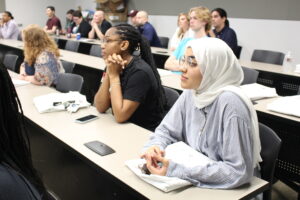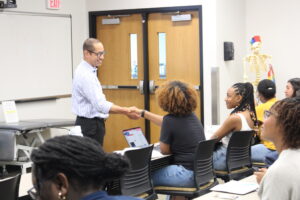Undergraduate research internship promotes a more diverse future workforce
 In the nation’s biomedical sciences workforce, diversity is not just an aspirational ideal but a proven way to increase access to health care and reduce health disparities in historically underrepresented communities. The Institute for Health Disparities at The University of North Texas Health Science Center at Fort Worth is on a mission to advance the career paths of research and health professionals that reflect the diversity of those they will eventually serve.
In the nation’s biomedical sciences workforce, diversity is not just an aspirational ideal but a proven way to increase access to health care and reduce health disparities in historically underrepresented communities. The Institute for Health Disparities at The University of North Texas Health Science Center at Fort Worth is on a mission to advance the career paths of research and health professionals that reflect the diversity of those they will eventually serve.
The Institute’s Summer Undergraduate Research Internship Program has existed in one form or another for more than 35 years and, through various grant efforts, has evolved over time to encompass several other initiatives, such as Summer Multicultural Advancement Research Training, or SMART.
SRIP welcomes undergraduate students from across the country to HSC’s campus for a mentor-guided research training experience. Students are selected and matched with a mentor, faculty and staff members at HSC, based on their research interests.
Student participants journey from minority-serving institution partners and colleges across the country to converge at HSC for this invaluable training opportunity. The group of SRIP students this year attend institutions like Howard University, University of Pennsylvania, the University of Texas at Austin — along with its campuses in Arlington and Dallas — Fisk University, Dillard University, Purdue University, HSC and more.
“The goal of SRIP is to encourage more highly motivated students from diverse backgrounds and underrepresented groups to pursue careers in health sciences and health disparities research,” said Dr. Jamboor Vishwanatha, Regents professor and vice president of the Institute for Health Disparities. “How can we expect to make real change in the realm of health disparities if our future researchers do not represent the population they seek to impact? That’s why this program is vital.”
 On Monday, May 15, the Institute kicked off this year’s program by welcoming 38 participants to campus and introducing them to the mentors who will guide them over the next 10 weeks. Twenty-four faculty members from four HSC schools — College of Pharmacy, School of Biomedical Sciences, School of Public Health and Texas College of Osteopathic Medicine — are volunteering as mentors to the SRIP students.
On Monday, May 15, the Institute kicked off this year’s program by welcoming 38 participants to campus and introducing them to the mentors who will guide them over the next 10 weeks. Twenty-four faculty members from four HSC schools — College of Pharmacy, School of Biomedical Sciences, School of Public Health and Texas College of Osteopathic Medicine — are volunteering as mentors to the SRIP students.
During the welcome event, students received their ID badges and lab coats, heard a little about the research each faculty member is conducting and were introduced to their mentors. Dr. Michael Mathis, dean of SBS, and Dr. Charles Taylor, HSC provost and executive vice president of academic affairs, welcomed the students to the program, congratulated them on being selected and wished them well over the next nearly three months of hands-on lab experience.
Throughout SRIP, undergraduate students work closely with their mentors to enrich their understanding of biomedical sciences and health disparities. This includes mentoring workshops, role-model seminars and lecture series that help students develop their competencies in science, research presentations, professionalism and communication. At the end of the program, the SRIP participants will give poster presentations on their research findings.
“We have served more than 650 students in this program since 2018,” said Dr. Harlan Jones, director of the Institute for Health Disparities. Jones himself participated in a similar program at HSC, National Institutes of Health Bridges to the Doctorate before he earned his Ph.D. here in biomedical sciences.
“Some SRIP participants have even gone on to become graduate students here at HSC like I did,” Jones added. “By engaging these students as undergraduates, we’re not only helping them build up these critical skills in a lab setting but also ensuring the legacy of this integral initiative to diversify the biomedical workforce.”






Social media